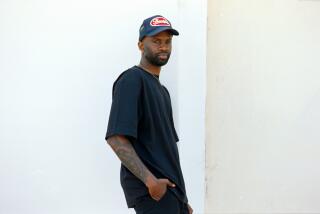<i> Finding Our Fathers </i> : The Unfinished Business of Manhood<i> by Samuel Osherson (Free Press: $17.95; 190 pp.) </i>
According to Samuel Osherson, a therapist in his mid-30s, itâs tough being a man these days. He offers himself as a case in point. His father, emotionally austere and uncommunicative, is the unwitting villain here; his nurturing mother, the instrument of grace. Cast as victim, the author strives, in his own marriage, fatherhood and career, to pick up the broken pieces of his boyhood and put them together into a man.
The theme is important. From generation to generation, men have struggled toward maturity haunted by their fathers. In classic form, the young manâs challenge is not only to vanquish his father on some symbolic field of combat, but also to be blessed by him. So understood, it is a noble if perilous contest. When the nobility is stripped away, when the fatherâs image no longer spurs his son on to greater heights, but rather bequeaths him with unpayable debts, only the peril remains.
The question is, what happens to those boys who were reared under one model and then are fated to live by a different one? According to Oshersonâs own account and the stories he tells about men he has interviewed, what often happens is that, having been caught in between, men are insecure in their manhood, riddled with conflict, and emotionally unequipped to redress their pain. His solution is to confront the âwounded fatherâ within, embrace and forgive him, and, once having isolated the cause of oneâs own vulnerability, to accept oneself and begin anew.
Vulnerability is the watchword here. It appears on almost every page. âIn growing up, men have great difficulty coming to terms with dependency and vulnerability, often because our fathers showed us that such feelings were unacceptable. . . . Because we have not been more able to nurture the needy, vulnerable parts of ourselves, we carry around within an angry, sad, childlike residue, which often shapes our adult relationships.â There is truth here, but after 200 pages of tears, one is left feeling sorrier for the women who have to live with such men than with the men themselves.
Useful observations are scattered through Oshersonâs narrative. For instance, he reminds us that men often feel extraneous and suffer without empathy throughout their wivesâ pregnancies, miscarriages and deliveries. But even here, Osherson has an uncanny ability to trivialize his own truth. In the nurseâs office for his wifeâs three-month checkup, he writes, âSitting in that examination room looking at the nurse, standing there all composed and pretty in her white uniform, my anger became palpable. . . . Memories of girls in high school flooded my mind. Girls, adolescent, standing near the school entrance in formidable herds talking hushedly among themselves. As a teen-ager, a line is drawn between the sexes. Thereâs the rub: This vulnerability, feeling like a leaky bag of hopes and fears, while the woman seems all composed and competent. . . .â
Without intending to, Osherson contributes extensively to the psychiatric annals of a complex that may be called âwomb envy.â The husband âwatches his wife get enormous amounts of caring and attention, which can intensify his own wishes for the same. . . . The wife will be on the examining table, her feet in the stirrups, the nurse or doctor standing, attending to the wife. The husband will often be sitting or standing in the corner, holding the coats.â Itâs hard to feel sympathy for such victims.
Though ostensibly a book about fathers and sons, the dominant preoccupation in âFinding Our Fathersâ is the helplessness and confusion many men apparently feel today in their relationships, especially sexual, with women. A better title for this book might have been âMale Vulnerability, Dependence and Confusion in the Presence of Contemporary Women.â Instead we have a kind of âDaddy Dearestâ in which maleness is the criminal and men the victim. Despite its lack of answers, if your own struggle is rooted here, I expect that this well-meaning book may ease your pain.
More to Read
Sign up for our Book Club newsletter
Get the latest news, events and more from the Los Angeles Times Book Club, and help us get L.A. reading and talking.
You may occasionally receive promotional content from the Los Angeles Times.








